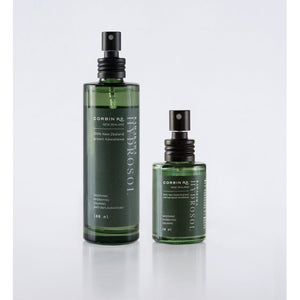Gina Urlich – BHSc Clinical Nutritionist
As the weather cools down many of us notice a change in our skin.
Winter can be a particularly triggering time for those with sensitive & dry skin, but, know that there are some simple micro habits that will nourish your skin from the inside out, keeping your skin soft & hydrated.
Hydration is key and is always the first step that I recommend
Many of us can become habitually dehydrated as we drink less water in cooler months. Drinking water sets your body up to function at its best, which benefits not only your body’s largest organ but so, so much more. When your cells are hydrated, it shows on the outside.
Herbal teas are a beautiful way to hydrate your cells in winter if you’re struggling to get your 8 glasses of water in. The bonus of drinking herbal tea is the infusion of nourishing medicinal herbs into hot water. It is a beautiful ritual & method to keep skin hydrated & healthy.
My favourite teas for the skin are:
- Nettle, rich in vitamins & minerals, promotes circulation, antifungal & antibacterial.
- Rooibos, powerful antioxidant, excellent source of alpha hydroxy acid, which is fabulous for skin health.
- Chamomile, known for its calming effect on the body, chamomile can also be particularly useful for stress-related digestive issues. It is also high in antioxidants combating free radical damage.
- Dandelion, aids our digestive system by maintaining the proper flow of bile. It is also high in vitamins, minerals & antioxidants.
Your digestive system
Since everything is so incredibly connected, I’m going to take you on a deep dive into the digestive system. The skin is like the external window into the internal digestive system and any kind of topical condition like eczema, psoriasis, acne or dermatitis requires some internal treatment.

Your digestive system is responsible for breaking down your foods, absorbing the nutrients from that food and filtering any waste products or toxins out of your body. Those nutrients are the building blocks of cells, including skin.
So lets look a little deeper into breaking down and absorbing nutrients.
The best way to tell that your body is able to absorb nutrients from your food is by your bowel motions.Undigested food in a bowel motion is a clear sign you’re not breaking down food or your transit time is too fast. Floating stools or an oily film on the toilet water tells me there is some fat malabsorption (absorbing fats is very important for dry skin).
Your body must have clear elimination pathways to get rid of waste and toxins: kidneys and urine, skin and sweat, and through bile and the intestines, when these elimination pathways are working optimally our skin looks clear and supple.
A crucial element in having healthy skin is having a healthy balanced gut bacteria.
Our gut and the skin are our two interfaces between the internal world and the external world, having a healthy microbiome (balanced gut bacteria) is essential to maintaining healthy skin (1).
Your overall gut bacteria is reflected in having a normal, daily bowel movement. If you’re experiencing regular diarrhoea or constipation you can make the assumption that your gut microbiome is off, which can be a contributing factor to skin problems (2).
Probiotics are essentially beneficial bacteria that can exert positive effects on your gut as well as your skin as they are passing through. You can get a diverse range of probiotic strains from foods such as kombucha, kimchi, sauerkraut, yoghurt & kefir.

If gut health is an issue for you then a consultation with a nutritionist is recommended for probiotic supplementation –
The gut is the epicentre for overall wellbeing
Now once your gut is working optimally lets get all the good nutrients in to be absorbed & utilised.
The intake of omega 3 fatty acids is important to skin health, not only for hydration in the winter months but also for the anti-inflammatory effects.
Most of us are deficient in this essential fatty acid since it is very low in our modern diets. The best sources of omega 3 fatty acids are fatty, oily fish like salmon, cod, sardines, seaweed and algae, chia/flax/hemp seeds, walnuts, coconut & avocado.
Key vitamins & minerals
Focus on foods rich in Vitamin A, Zinc and Vitamin E as they are all important for skin health. Zinc is critical for the formation of collagen, a protein molecule that forms connective tissue and skin. Foods rich in Zinc are meat, shellfish, legumes (chickpeas, lentils, beans), seeds (pumpkin, hemp), nuts, eggs, dairy, whole grains (spelt, rice, oats).
Vitamin E helps to combat oxidative stress and keeps the skin youthful. Foods rich in this fat-soluble nutrient are sunflower seeds, almonds, avocados, other nuts (like hazelnut, pinenut), spinach and other greens.
Vitamin A is a fat-soluble nutrient that plays an essential role in body growth, immune health, vision, reproductive and skin health. Good sources of vitamin A are animal liver, cod liver oil, egg, sweet potato, carrot, spinach, broccoli, mango and papaya.
Antioxidants
I couldn’t talk about skin health without adding in the importance of antioxidants. The bright colourful pigments in your fresh produce are a vital component of maintaining good skin health and contain many anti-aging properties. Found in berries, leafy greens, dark chocolate – cacao, beetroot, and in super foods like brazil nuts, goji berries and spirulina. Antioxidants promote cell turnover and fight the resulting oxidative stress to aid with our body’s and skin’s natural repair.
Changes in gut and liver health, hormone imbalances, dehydration, lack of sleep and inflammation can all show up on the skin as tell tale signs that we need to make a change.
Like every season, we need to adapt our diet accordingly. Our winter diet should consist of warm foods with lots of cooked fruits & vegetables to help us feel nourished and grounded. Start the day with a small bowl of oats, rice or quinoa flavoured with stewed fruit, honey or cinnamon. For lunch and supper, choose nourishing foods such as steamed vegetables, slow cooked stews, soup or kicharee. Avoid raw or cold food & drinks this adds pressure to the digestive system.
During Winter, nature pauses its usual processes and prepares for a season of rest and restoration to enable new growth and life in the Spring. Stillness and energy harmonized together are the foundations of wellness in nature and also within ourselves.
As we go deeper into Winter, nature is inviting us to take time for rest, and it's up to us to accept the invitation.

Nourish, Rest & Nurture
With love
Gina xx
- https://gut.bmj.com/content/65/1/57



